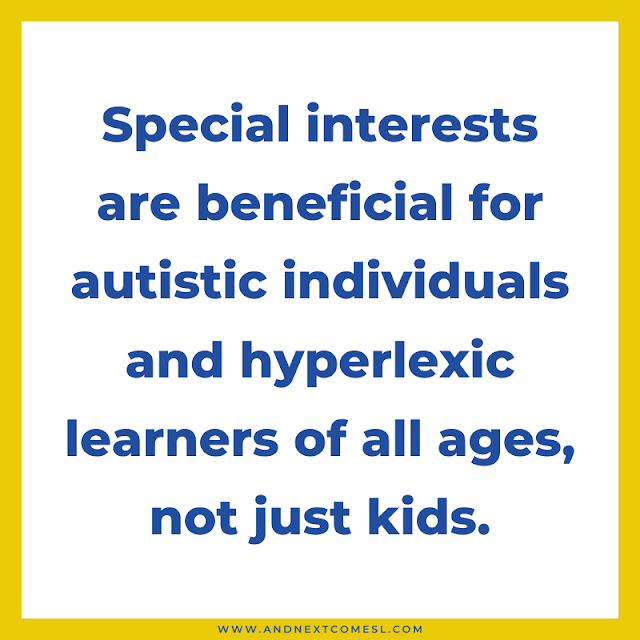Special interests are a common autistic trait. One that, like many other autism traits and behaviors, is often misunderstood, pathologized, and/or viewed in a negative light. Even though there's plenty of evidence that highlights how important special interests are to autistic identity and culture.
Too often, professionals and specialists tell parents to discourage their autistic or hyperlexic child's interests or help them find more "appropriate" interests (whatever that means...appropriate is so subjective).
It's so frustrating how often parents of hyperlexic children are told to take away their letters. Here's why you shouldn't. It's actually one of the most common mistakes that professionals make when it comes to hyperlexia (see mistake #4).
Yet, many autistic adults are outspoken about how important these special interests are. There's also plenty of research that confirms that special interests are indeed beneficial to autistic individuals.
As you will see below, there are certainly lots benefits of special interests in autism and hyperlexia. So let's take a closer look at why it's important to encourage and nurture your autistic or hyperlexic child's special interests.
20 Benefits of Special Interests for Autistic or Hyperlexic Learners
There are plenty of reasons why special interests are beneficial for autistic or hyperlexic individuals, regardless of their age. So these benefits do apply to toddlers, preschoolers, elementary aged kids, middle schoolers, teens, and even adults. In other words, they aren't specific to a particular age.
It's also important to note that these benefits aren't limited to only certain types of interests. They can literally apply to any type of special interest that an autistic or hyperlexic learner might have.
So, with those points in mind, the benefits of special interests include:
1. Source of pleasure, enthusiasm, and positive emotions (i.e., it gives them immense joy!)
2. Naturally and intrinsically motivating and rewarding
3. Provide a sense of pride
4. Boost self-esteem
5. Contribute to overall well-being
6. Reduce anxiety by being a source of comfort, acting as a distraction when stressed, and offering a protective effect
7. Can be used as a coping strategy to deal with emotions or sensory overload
8. Build self-confidence, competence, and autonomy
9. Serve an an area of expertise and strength and help develop rich knowledge
10. Promote learning and cognitive development
11. Lead to specialized skills and abilities and may boost other important skills that needed further development (e.g., motor skills, comprehension, spelling, communication, etc.)
12. Improve focus and attention
13. Increase engagement, participation, and productivity
14. Are enriching
15. Increase joint attention
16. Help with social language and communication skills
17. Boost social skills, promote social interaction by providing opportunities to engage with others, and provide a source of connectiveness (especially if those others have similar interests)
18. Build relevant skills for later employment
19. May launch or lead to a future career
20. May lead to more successful employment and professional experiences once employed
Sources: Burrows et al. (2021), Harrop et al. (2018), Nowell et al. (2020), & Patten Koenig & Hough Williams (2017)
Some Final Thoughts on Why Special Interests are Beneficial
As you can see, there are plenty of positives to letting autistic and hyperlexic individuals engage with their preferred interests, no matter what those interests are or how unusual they may appear to be.
One of the best things you can do as a parent, therapist, or teacher is encourage their interests and incorporate them into other things as much as you can. That's something you'll hear me say a lot when talking about hyperlexia.
Conversely, discouraging, limiting, or taking their interests away can cause significant distress to the individual. It's cruel, really.
Plus, it's super disrespectful to the individual. You just end up sending them the message that their interests are somehow wrong or less then, which they're not. Who gets to decide that sports or horses are somehow better interests than elevators or letters?
Anyway, the benefits of special interests range from social emotional development and improved well-being to increased motivation and valuable skill development. All of which are important, don't you agree?






